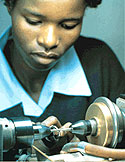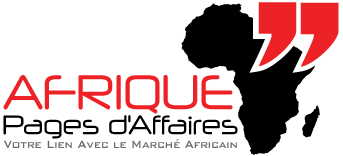>> Business Guide Africa > Eritrea in Focus
ERITREA - GATEWAY TO AFRICA
Africa's newest independent country makes a promising start as a regional distribution centre
E ritrea
is on a quest to build its nation with sweat, not debt.
Though impoverished by its war for independence, Eritrea
is rich with spirit, resourcefulness and knowlege. The country
has made a vow to recreate itself with the expertise of
its people, not foreign capital. Since winning their independence,
Eritreans have turned their energies inward, building self-sufficiency
and rejecting any outside help that does not move them further
toward political and economic autonomy. Eritrea's leaders,
part of the rebel movement-turned government, are determined
to remain fee from the influence of governments that ignored
their struggle, and to avoid mistakes made by other African
countries in the post-independence era. The country's watchwords
are improvisation and self-reliance. A symbol of those watchwords
is the Eritrean government's huge endeavor to rebuild the
73 mile railroad which once ran from the port of Massawa
across the desert and up through the mountains to the cool
highlands where the capital, Asmara, lies. For twenty years
it was an efficient system, carrying freight and passengers,
and was the largest employer in the country.
 The
railroad, first built by Italians, stopped running in 1974.
It's rails were disassembled for other uses during the long
war with Ethiopia. The track was torn up and scattered across
the hillsides. Steel sleepers were used in trenches and
tunnels during the war and by villagers to build their homes.
The rolling stock was left to rust. The huge railyards in
Asmara with sheds, workshops, stores and foundries were
abandoned, dismantled, scattered and plundered. The engine
turntable was buried under tons of earth. Soon after the
war, it became clear that Eritrea needed to rehabilitate
the railway to take pressure off of the over-used two-lane
road which moves goods from the port to the capital and
cities farther inland. Every afternoon the road is jammed
with trucks laboring up the mountains at five miles an hour.
Rebuilding the railroad is a daring strategy for Africa's
newest nation.
The
railroad, first built by Italians, stopped running in 1974.
It's rails were disassembled for other uses during the long
war with Ethiopia. The track was torn up and scattered across
the hillsides. Steel sleepers were used in trenches and
tunnels during the war and by villagers to build their homes.
The rolling stock was left to rust. The huge railyards in
Asmara with sheds, workshops, stores and foundries were
abandoned, dismantled, scattered and plundered. The engine
turntable was buried under tons of earth. Soon after the
war, it became clear that Eritrea needed to rehabilitate
the railway to take pressure off of the over-used two-lane
road which moves goods from the port to the capital and
cities farther inland. Every afternoon the road is jammed
with trucks laboring up the mountains at five miles an hour.
Rebuilding the railroad is a daring strategy for Africa's
newest nation.
Unable to pay foreign contractors the millions the project was estimated to cost, (Italian engineers estimated it would cost at least $500 million), the Eritreans have conscripted their own countrymen. President Isaias Afwerki has called dozens of former railroad workers out of retirement and put them to work. At first the older railroad mechanics could not believe their ears when they got the call from the new president. Some grumbled that they were too old to pick up a hammer again.
In a few days, however, they all came to work in their outdated overalls and engineer caps. Rather than borrow millions of dollars from foreign banks, the government is using donated food to pay people to build the railroad and to work on other projects. “We have the capacity for self-sufficiency,” President Afwerki said in an interview. “We don't believe aid can solve our problems.” The average annual income in Eritrea is less than $150 per person, and two-thirds of its people need food aid.
Today, hundreds of workers armed with picks and shovels have extended the railroad many miles inland from Massawa. “In less than three years time we will have a railway running from Massawa to Asmara”, Amanuel Gebreselassie, coordinator of the Railway Rehabilitation Project, stated in an interview. That confident approach is typical of a country whose independence war motto was: “Never kneel down”.
| THE DUBAI CONNECTION |
|---|
Eritrea Begins Sourcing From Dubai |
 The
United Arab Emirates has been supplying goods to Eritrea
not only for its local consumption but also for distribution
to neighbouing markets in Sudan and Ethiopia - the largest
markets in terms of size and consumption in the region.
The geograhical proximity of the UAE makes it an ideal
trade partner for Eritrea. Goods from UAE are shipped
directly to Eritrea and then onwards to Ethiopia and Sudan.
The fact that these countries do not have a well developed
manufacturing base means that they have to import most
of their requirements for consumer and capital goods.
The
United Arab Emirates has been supplying goods to Eritrea
not only for its local consumption but also for distribution
to neighbouing markets in Sudan and Ethiopia - the largest
markets in terms of size and consumption in the region.
The geograhical proximity of the UAE makes it an ideal
trade partner for Eritrea. Goods from UAE are shipped
directly to Eritrea and then onwards to Ethiopia and Sudan.
The fact that these countries do not have a well developed
manufacturing base means that they have to import most
of their requirements for consumer and capital goods.
At present there are only approximately 2,500 manufacturing
enterprises in Eritrea. Most of the 730 enterprises which
were in existence as on May 24, 1991 were more than 20
years old (the oldest going back 10 1901). About 500 have
been established after liberation. Manufacturing units
which were established and run by the Eritrean People's
Liberation Front during the liberation war for the production
of plastic shoes, sanitary towel, baby food, bandage,
macaroni, plastic household utensils, knitwear and engineering
workshop products have been merged to related state enterprises.
Export for 45 state enterprises, all the rest are privately
owned. Most of them are owner operated and single proprietorship
serving customers in their immediate locality.
Currently,
the sector which is in need of modernisation and rehabilitation
is very much dependent on imported raw materials, spare
parts, machinery and know-how. The major current manufactures
of the country are composed of
a) Food - flour, bread, canned food, pasta, biscuits,
sweets, vegetable oil, butter, cheese >>> Beverages:-beer,
liquor, soft drinks , mineral water >>>Tobacco:cigarette,
chewing tobacco
b)Textiles:- fabrics, yarn, garments, knitwear, sacks,
twine, sweaters, blanket, bed sheet, towels.
Business
Advise
HOW
TO PROMOTE YOUR PRODUCTS IN AFRICA
 Eritrea
is a new and upcoming country. Therefore, opportunities
for trade and business are plenty. The country is still
in the process of building its infrastructure and establishing
its presence in the world of international trade and commerce.
Though relatively small in size, Eritrea has emerged as
the gateway to the huge markets of Sudan and Ethiopia.
Eritrea retained the entire coastline of Ethiopia along
the Red Sea upon de jure independence from Ethiopia. The
two major ports of Eritrea, namely Assaib and Massawa,
are located along the world’s busiest shipping lanes.
Therefore, Eritrea’s importance as a regional centre
for trade and distribution can never be underestimated.
There are a few easy ways to make your presence felt in
Eritrea and neighbouring countries like Sudan and Ethiopia.
Eritrea
is a new and upcoming country. Therefore, opportunities
for trade and business are plenty. The country is still
in the process of building its infrastructure and establishing
its presence in the world of international trade and commerce.
Though relatively small in size, Eritrea has emerged as
the gateway to the huge markets of Sudan and Ethiopia.
Eritrea retained the entire coastline of Ethiopia along
the Red Sea upon de jure independence from Ethiopia. The
two major ports of Eritrea, namely Assaib and Massawa,
are located along the world’s busiest shipping lanes.
Therefore, Eritrea’s importance as a regional centre
for trade and distribution can never be underestimated.
There are a few easy ways to make your presence felt in
Eritrea and neighbouring countries like Sudan and Ethiopia.
The
growing use and influence of the Internet can also be
harnessed to promote your business in the African markets.
By posting your business proposals on the African Classified Advertisements section, you can expect direct responses
from your business counterparts in African countries.
Employing the growing influence of Internet technology
to promote your business in international markets is one
of the most simple and effective promotional tool for
forward-looking enterpreuners. Simply post your message
and wait for the results. Simple!
An even better way to promote your business interests in Eritrea is by contacting your business counterparts from the of Eritrea which offers you the opportunity to communicate directly with your business counterparts in Eritrea. The E-Mail Directory of Eritrea can also be utilised to obtain useful information on local market conditions and to assess the prospects of marketing your product/s in the Eritrean market. Not to mention the chances of meeting some very helpful, interesting and enterprising people from Eritrea!
Last, but not least, add your company to the of the Africa Business Pages. The Advertising Section will carry a full page editorial about your company as well as two pictures of your company's products. In addition to this, your company will also be provided with a direct link in the Business Links section. By promoting your company on the Africa Business Pages you can reap rich dividends. An absolute essential for those targetting the African market. Browse through some before taking a decision.
- Related Video
Eritrea: The Rising Star of Africa

Annoncez dans le magazine
Magazine en ligne
Télécharger Annuaires Afrique
Ajouter votre Profil de l'entreprise
-
 Arabian Jerusalem Company:
Arabian Jerusalem Company:
L'un des principaux fournisseurs de machines et de matériel de construction neufs et d'occasion. Les produits incluent des Grues, Jantes Chargeurs, Bulldozers, niveleuses, rouleaux compresseurs, Tractopelles JCB, Pelles, générateurs, compresseurs d'air, etc .. Bétonnières -
 Global Auto Parts:
Global Auto Parts:
Fournisseur de toute une gamme de pièces d'automobiles après-vente pour une grande variété de voitures. Recherche distributeurs et des agents en Afrique... -
 World Wide Auctioneers:
World Wide Auctioneers:
Auctioneers de machines neuves et d'occasion contruction, de machines industrielles, de transport et d'équipements lourds. World Wide Auctioneers est également l'agent pour Unic Grues et un nom de renommée mondiale dans le dépôt de machines et d'équipements lourds ... -
 Hollywood Style Cosmetics:
Hollywood Style Cosmetics:
Gamme complète de produits cosmétiques qui sont extrêmement populaires auprès des acheteurs africains. La société offre des promotions pour les clients africains et la recherche de distributeurs en Afrique... -
 Solite Batteries:
Solite Batteries:
Batteries Solite gagnent en popularité dans les marchés africains en raison de leur longue durée de vie et des prix compétitifs. Contactez directement les concessionnaires et économiser de l'argent
-
 Marchands de pneus à Dubaï
Marchands de pneus à Dubaï
Contactez-exportateurs à Dubaï spécialisée dans les pneus, les tubes et les batteries. Offres spéciales pour les acheteurs africains offerts... -
 Le marché des pneus en Afrique
Le marché des pneus en Afrique
Importateurs en Afrique sont à la recherche de nouvelles sources d'approvisionnement pour répondre à la demande croissante de pneus dans les marchés africains ... -
 Trouver des partenaires commerciaux en Afrique
Trouver des partenaires commerciaux en Afrique
Lignes directrices sur la façon de trouver des partenaires commerciaux, des agents, des distributeurs sur les marchés africains... -
 Répertoire des entreprises Nigeria
Répertoire des entreprises Nigeria
Télécharger le Répertoire des entreprises Nigeria en format Excel. Liste des entreprises au Nigeria sous différentes catégories commerciales...
-
Stay up to date

- Abonnez-vous au flux RSS





Exporters in Dubai Selling Into Africa